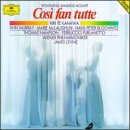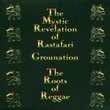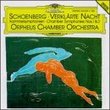| All Artists: Wolfgang Amadeus Mozart, Wiener Philharmoniker, James Levine, Kiri Te Kanawa, Ann Murray, Marie McLaughlin, Hans Peter Blochwitz, Ferruccio Furlanetto Title: Mozart: Cos� fan tutte / Te Kanawa, Murray, McLaughlin, Blochwitz, Hampson, Furlanetto; Levine Members Wishing: 0 Total Copies: 0 Label: Deutsche Grammophon Release Date: 9/27/1989 Genre: Classical Styles: Opera & Classical Vocal, Historical Periods, Classical (c.1770-1830) Number of Discs: 3 SwapaCD Credits: 3 UPC: 028942389724 |
Search - Wolfgang Amadeus Mozart, Wiener Philharmoniker, James Levine :: Mozart: Cos� fan tutte / Te Kanawa, Murray, McLaughlin, Blochwitz, Hampson, Furlanetto; Levine
 | Wolfgang Amadeus Mozart, Wiener Philharmoniker, James Levine Mozart: Cos� fan tutte / Te Kanawa, Murray, McLaughlin, Blochwitz, Hampson, Furlanetto; Levine Genre: Classical
|
Larger Image |
CD DetailsSimilar CDs |
CD ReviewsGlorious Cosi Scott Jelsey | Houston, TX United States | 06/25/2003 (5 out of 5 stars) "First off I noticed that the Overture is well sprung at exactly the right tempo. One immediately notes the nicely balanced playing of the VPO, the special Viennese sound of strings and wind. Enter the two upright soldiers in the pleasing shape of Blochwitz, a Ferrando with silvery tone and a fine edge at once apparent, to his characterization, his feliow officer, the mellifluous and lively Thomas Hampson. They are challenged to stand up for the fidelity of their girlfriends by the evidently jovial, smiling Alfonso of Furlanetto, not a cynical observer like Claudio Desderi (Haitink/EMI), nor an intimate schemer like Sesto Bruscantini (Karajan/EMI), but as authentically Italian as either, and thus confident and confidential in his recitative. The bargain is struck and we are in the loved ones home. Here we encounter the deliciously spirited Dorabella of Ann Murray, not as smooth-voiced as Dolores Ziegler (Haitink) nor exhibiting quite the authority of Christa Ludwig (Bohm/EMI) or Agnes Baltsa (Muti/EMI), but a lady of mettle, adept at fashioning her words to her tone. And what's this? Dame Kiri, somewhat penny plain as Fiordiligi in the old Lombard Erato version, here appears to be following the example of Elisabeth Schwarzkopf (Bohm) in playing with her words-listen, much later, to Sospirando, i sospiretti in the duet of choice in Act 2. Then there's another surprise; when Despina makes her delayed entry she might almost be a third sister. Marie McLaughlin sounds more like a Fiordiligi than a traditional Despina, and tends to overawe her employers, missing something of the downmarket insouciance of Lillian Watson, the Glyndebourne Despina (Haitink) or the knowing manner of Steffek (Bohm). So an interesting sextet of characters are assembled under the keen-edged and authoritative baton of Levine, and they develop a fair sense of a stage performance, all being experienced in their roles in the theatre. Although Levine's conducting isn't particularly loving or even individual, he shapes the score with the confidence of a maestro with many perfomances of the opera under his belt. It just lacks the last bit of tenderness and warmth of Bohm, the human touch of Davis (Philips), and the refined sensibility of Karajan. Te Kanawa, at her absolute peak, sings with a great deal of creamy, luscious tone, with sensitive word pointing and flawless intonation. There are a few moments when awkward corners in the arias are only just negotiated, or one notes a touch of sentimentality in the phrasing, for instance, the scoops at perdera la rimembranza in the rondo aria, yet the portrayal as a whole does come to life quite vividly. This Fiordiligi is not quite as cleanly or securely sung as that of Vaness (Haitink), but Te Kanawa makes the woman more palpable and approachable as a personality. Murray's Achilles' heel is a tendency for an edge to catch the microphone and upset the flow of the tone-and should Dorabella actually sound lighter in timbre than her sister? Blochwitz sustains the line and shape of his three taxing arias, but the last two do reveal some insecurity at the very top. John Aler (Haitink) is the more accomplished singer, Blochwitz the more skilful actor with his voice-I like the sense of vulnerability he conveys. Hampson is the one singer who gives complete satisfaction in voice and characterization-this is a near-ideal Guglielmo bonhomous, seductive, and golden in timbre though not really Italianate like Rolando Panerai (Karajan). Marie McLaughlin's naturally full tone is welcome in her vocally assured arias, but one cannot get away from the fact that Despina should really be more sharply contrasted with her mistresses. Desderi (Haitink) is fleeter, more considered in his recitatives than Furlanetto but then Furlanetto, more than any of his colieagues given that his part is mostly recitative, is up against the extraordinary treatment of the "speech" by Levine and his choice of a fortepiano and bass to accompany the recitatives. An interesting touch, on the whole, distinguishing this later 1790 opera from its earlier Da Ponte siblings, Figaro and Don Giovanni. The text is very complete, including the duettino for the soldiers in Act 1. Levine opts for Guglielmo's Rivolgete for his First Act aria; Mozart replaced this before the premiere with the much more appropriate, shorter and more familiar Non siate ritrosi, here consigned to an appendix at the end of the first CD, a questionable decision, though it's good to hear Hampson in both. The recording on the new DG is immaculate. There's plenty of presence, and a nice balance between voices and orchestra. Peter Branscombe contributes an authoritative note on the work's sources and construction. In spite of my few reservations this set can compete with Haitink's as far as recent versions made in up-to-date sound are concerned, though I slightly prefer the unanimity of approach on the EMI, but if you want to catch more of the work's ceaseless ambiguities and inner subtleties you'll need to turn back to the Davis, which can arrest the ear with a detail or a phrase or a dramatic irony not always found in more modern readings. Overall, though - HIGHLY RECOMMENDED." Superb performance of a flawed masterpiece madamemusico | Cincinnati, Ohio USA | 02/26/2004 (4 out of 5 stars) "Mozart's opera "Cosi fan Tutte" (1790), a popular favorite through the early decades of the last century, has lost favor since about the 1970s as women have gained more autonomy and self-awareness. Part of the problem is not only that the women are duped into falling in love with each other's fiancées, but that they are not "ditzes" like Lucille Ball or Gracie Allen, but fairly nice, bright young women. As a result, it somehow doesn't seem fair that the joke is "on them."On the other hand, however, neither Ferrando nor Guglielmo, their fiancées, are the brightest crayons in the box, either, and so it is funny to see Don Alfonso and Despina fool them all over and over again. In recent years, too, Despina is often upgraded from servant to friend or neighbor as a way of showing the four younger people that their naïveté is a problem of age or class rather than intelligence."Cosi" survives, however, because the mature Mozart poured some of his most enchanting and beautiful music into it. In our era of "historically-informed performances," the tempos have sped up to the point where the music sounds more like a symphony for voices than an expression of human emotions, though in a sense this is better than the old school (represented by such conductors as Busch, Böhm and Karajan) with their softer contours and slower rhythms. What is often lost, however, is characterization, and finding a performance with 1) good voices in all the roles, 2) good tempi and 3) good vocal acting, is still a rare phenomenon.While most people seem to gravitate to the "all-star" cast conducted by the late Sir Georg Solti on Decca, I have some problems with it. Of the various principals, only Ann Sophie von Otter (Dorabella) and Olaf Bar (Guglielmo) have any sense of character. Renée Fleming sings beautifully but with not much sense of the words, while Frank Lopardo (Ferrando) has no playfulness and little honey in the voice.This 1989 recording, conducted by James Levine, goes a long way towards giving us a satisfying "Cosi." I fully agree with everything said below by tscott2, but would add three things. Ann Murray sings very well but the voice breaks into tremolo under pressure in "Smanie implacibili." Kiri te Kanawa, though in superb voice and surprisingly vivid characterization, does not have a "honeyed" tone, and so the trio "Soave sia il vento" lacks the magic that can occur from three perfectly-blended voices. And Levine, though choosing excellent tempi for the most part, drags out the overture nearly a minute longer than Sir Charles Mackerras or Arnold Ostman on their sets...the overtures there being among the best things about their respective performances.Highly recommended to both first-time and veteran "Cosi" listeners. This one has the feel of a real performance about it. Don't pass it up."
|

 Track Listings (23) - Disc #1
Track Listings (23) - Disc #1


